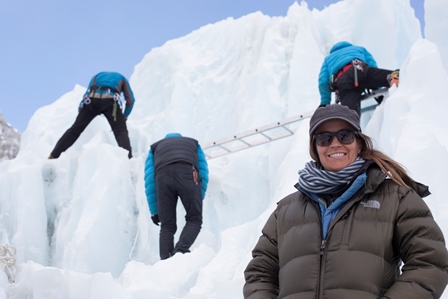Jennifer Peedom.
The Australian Directors Guild awards will be handed out in Melbourne next Friday, and ADG executive director Kingston Anderson is feeling bullish about the work under the spotlight.
"If you look at the nominations this year, you'll notice in some categories there are five nominations", Anderson said.
"That's unusual, and that's because a lot of the judging panels said the quality of the entries was so high. They noted that over the last three years they've seen the quality go up, across television and short film particularly."
Anderson calls the trend "really exciting, and gratifying. It's clear that we're producing good people, and we're continuing to produce good people."
He sees the ADG's annual awards, presented across eighteen categories, as vital.
"You've got the opportunity to see the best of the best in directing, in anything from short films through to feature films to online content to documentary to animation. And there's nowhere else where you can see that. The AACTAs only give out two or three directing awards."
"We do TVCs [as well], which is a huge area for Australian directors, so it's important. And all the people who get nominated feel really honoured, because we use a peer-based judging system, so you're being judged by people who work in your area."
The nominations this year are marked by the dominance of female directors in the documentary categories, a trend which Anderson puts down to ease of access.
"Directing a feature film, which I think is the toughest of the tough, regardless of your gender, is the hardest to get to. Whereas in documentaries there are more opportunities."
"And so it enables more women to be involved in that genre. If the barriers are there, anywhere in life, you tend to go to where the barriers are less."
But why do those barriers to feature filmmaking seem more insurmountable for women than men?
Anderson points to "a range of reasons. There's family issues, people [not] being given opportunities, all of these reasons preventing women. we'd like to have as many mediocre women directing as there are mediocre men. It's about an even playing field."
Also on the agenda is the ADG's Finders Award, a partnership with the Directors Guild of America in which an Australian film without US distribution is screened in LA and NY to distributors. This year it's been awarded to Sue Brooks' Looking for Grace.
But given the film premiered in Venice and then Toronto, surely distributors have already seen it?
"They may or may not have", said Anderson.
"There's a couple of things with Finders. One, to be eligible you have to have no distribution in the US. That obviously limits it. We only had a few films to look at, because most films now are able to get US distribution, whether it be online or SVOD."
"The other part is about profiling the director. I'll give you a good example of how this can affect someone's career. Before he was really known, Kriv Stenders won the Finders award and took a little film called Boxing Day to LA, and he met this guy called Nelson Woss [producer of Red Dog].
"Kriv said if he hadn't gone to LA, he would never have met Nelson, and Red Dog would never have happened. That's changed his career."
While Stenders may have been something of an unknown quantity, Brooks has had her films screened at the big international festivals for decades, including at Cannes, where Japanese Story played in Un Certain Regard in 2003.
According to Anderson, the Finders Award is "not just about [profiling] someone who isn't known. It's also about helping people push their careers to another level. Sue has certainly directed several films here, but she hasn't gone past that. It's about career building, and it's about the film."


